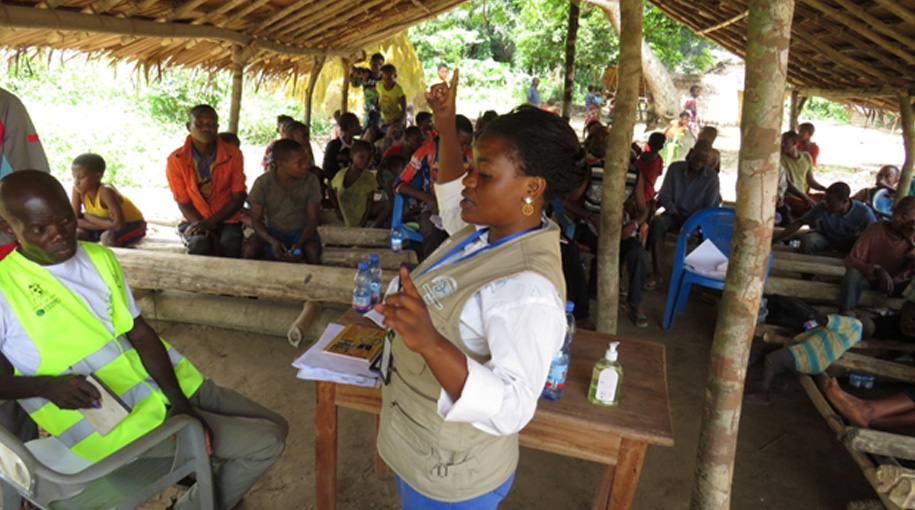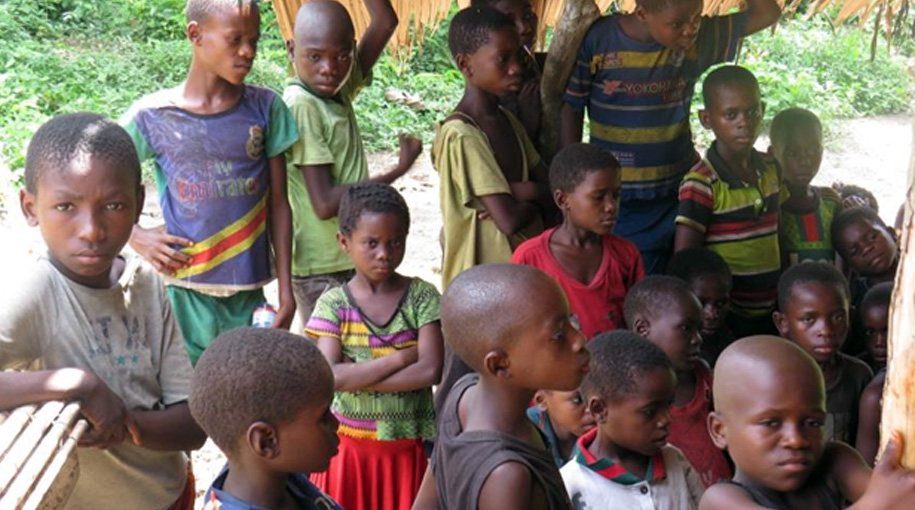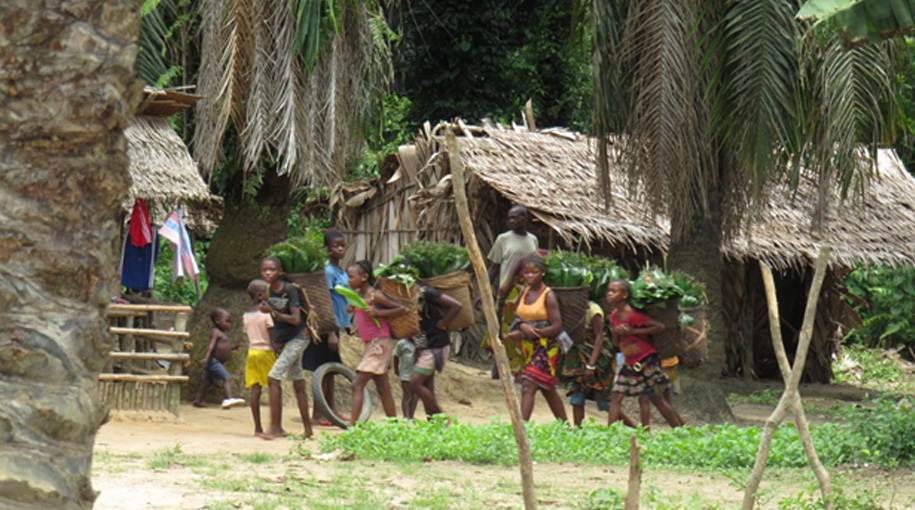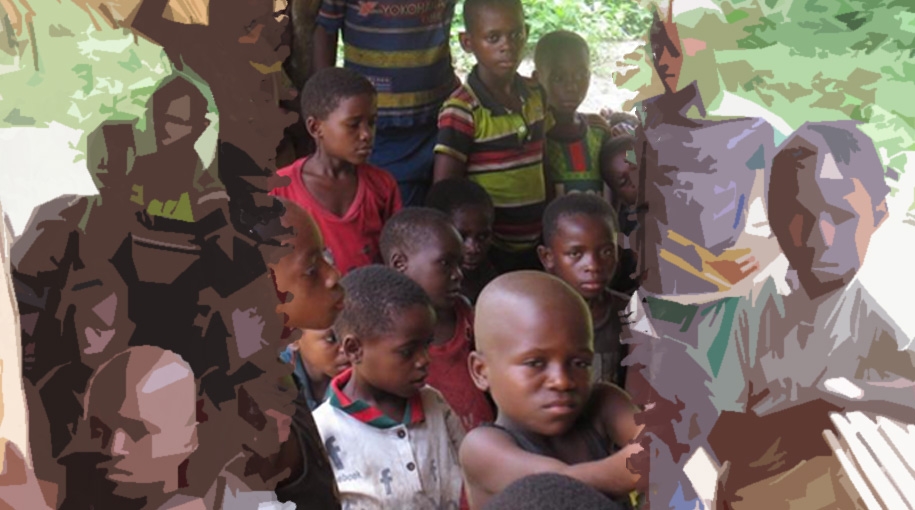Ensure inclusive and equitable quality education and promote lifelong learning opportunities for all. – Sustainable Development Goal 5
Fifty Twa or Pygmies in the village of Bolingo in the territory of Inongo, Maïndombe province in the Democratic Republic of Congo (DRC) participated in a two-day workshop last April 2022. The activity aimed to address the glaring and continuing lack of equal access to education by indigenous Pygmy children and youth in the DRC. Present during the workshop were the community chiefs and teaching personnel of the only primary school in the village.

During the discussion on the state of education of indigenous Pygmy children and youth in the village, Betoko Yando, director of the only primary school in Bolingo village, related that the said school is the only public primary school in the area, established 12 years ago. School children built it with adobe brick and covered it with thatch. Meanwhile, the nearest secondary school is 12 kilometers away where merely one Pygmy youth attended for a single year.
Yando also shared that no Pygmy child has been able to complete secondary school and only a few have been able to complete primary education. Additionally, there have been no Pygmy teachers to date. The dropout rate is 18/42, which is very high.
Bongeli Ibela, the clan chief of Bolingo village, explained that the lack of adoption of or resistance to education among Pygmies is due to the simple reason that their ancestors themselves did not appreciate Western education aside from not having enough savings to finance their own education and that of their offsprings.
However, Marisa Jockebed Sinafasi, the Gender Officer of DIPY, noted that the basic need for survival is the main reason for the children’s frequent absenteeism in school as expressed by their parents. Predominantly, it is not about the resistance of the Pygmy to Western-style education but the struggle for survival that takes precedence and detracts children from their school activities. When their children skip classes, parents keep them busy with domestic tasks. In particular, only the young girls are assigned by their mothers during school hours to pick wild banana leaves to sell at the market.
Mputu Eyingela, a primary school teacher, added that Twa children are openly penalized by the economic activities of the community. According to him, parents take their whole family including their school children to harvest non-timber forest products (NTFPs) like mushrooms, koala nuts and caterpillars during the harvest season, and to fish during the fishing season. Due to such economic activities, the children’s continued school attendance and completion of the school year are negatively affected.
He also said that teachers are all Bantu, one of the major ethnic groups in the DRC, who are also nomadic. Hence, in the middle of the school year, both the teachers and the pupils stop all school activities to go fishing and gathering, resuming classes once the fishing and gathering season is over.
Meanwhile, Booto Besinga, a prominent Pygmy in Bolingo, said that the Bantu made a lot of efforts to advance their education, as compared to the Twa, because they understand that their future depended on it.
Yando further stressed that indigenous children suffer greatly from the lack of parental supervision, with the children going to school without uniforms, notebooks, and pens—a reality reflected by statements shared by several school children.
Booto Boyoma, a pupil enrolled in the fourth year of primary school, said he liked going to school but that it was difficult without a uniform, notebooks and a pen—implements that are considered staple in most educational institutions. Another pupil enrolled in the fifth year, Nzako Bikupa, stressed that parents entrust their infants to their older children when they go to deliver and sell their NTFPs.

It was also noted from the workshop that some Bantu teachers are more likely to punish Pygmy children than Bantu children—a treatment that is also claimed to be one of the reasons why Pygmy children often opt to be absent or to drop out from school, according to the parents.
Aside from the glaring lack of adequate infrastructure, school supplies, uniforms, and other essential items, prevalent discrimination based on ethnicity has marginalized the Twas. Sharing meals with the Pygmies or eating meals prepared by a Pygmy is considered taboo by the Bantu people.
With all the obstacles and challenges identified, Gilbert Nkolokuta, an educated Pygmy and a volunteer in the Inongo territory, encouraged the parents and pupils to continue the struggle for economic and social empowerment which necessarily involves education. He told them that one major obstacle to equal access to education in the DRC is removed through the government’s free primary education. The free primary education in Bolingo village started just this school year, 2021-2022. Nkolokuta also called for parents to be actively involved in the education of their children.
In line with these, Sinafasi highlighted early marriage among young girls as another major concern, noting that many girls marry before reaching the age of maturity. They are also more prone to absenteeism and dropping out of school, with a 100 percent dropout rate in the sixth year of primary school.

In the identification of the prevailing situation regarding equal access to quality education among the Twa children and youth in the village of Bolingo, the participants drew recommendations that could respond to these issues:
One, to improve and make more sustainable and viable the single primary school’s infrastructure in Bolingo to be able to encourage an increased attendance of Pygmy children.
Two, the acquisition of a school canteen which could be subsidized by DIPY or other partners to further help motivate the Pygmy children to attend school.
Third, to have a secondary school established in Bolingo as it would be advantageous for the Pygmy children who will not need to travel 12 to 22 kilometers each day to reach a secondary school.
Notably, women participants also committed to allow their female children to study in the morning and to wait for them to come home from school before sending them to pick wild banana leaves used to wrap the papillotes and chikwangues that are very popular in the region.
An important achievement from the workshop is the endorsement of the participants of the action plan which aims to solve the inequitable access to quality education being faced by the Pygmy children and youth in the village of Bolingo. Prepared by Sinafasi, the action plan includes the introduction of the Twa language as a medium of instruction and the adaptation of the school calendar to the gathering, hunting and fishing seasons of the Twa people in Bolingo.
The workshop is part of the implementation of the advocacy plan by Sinafasi of DIPY, one of the ELATIA partners based in the DRC. The advocacy plan was her output during the virtual training on policy advocacy on the Sustainable Development Goals conducted in 2021 by the Indigenous Livelihoods Enhancement Partners (ILEPA) based in Kenya, Tebtebba and the ELATIA Indigenous Peoples Training Institute based in the Philippines. Moreover, the workshop was made possible through the small grant from Nia Tero.


